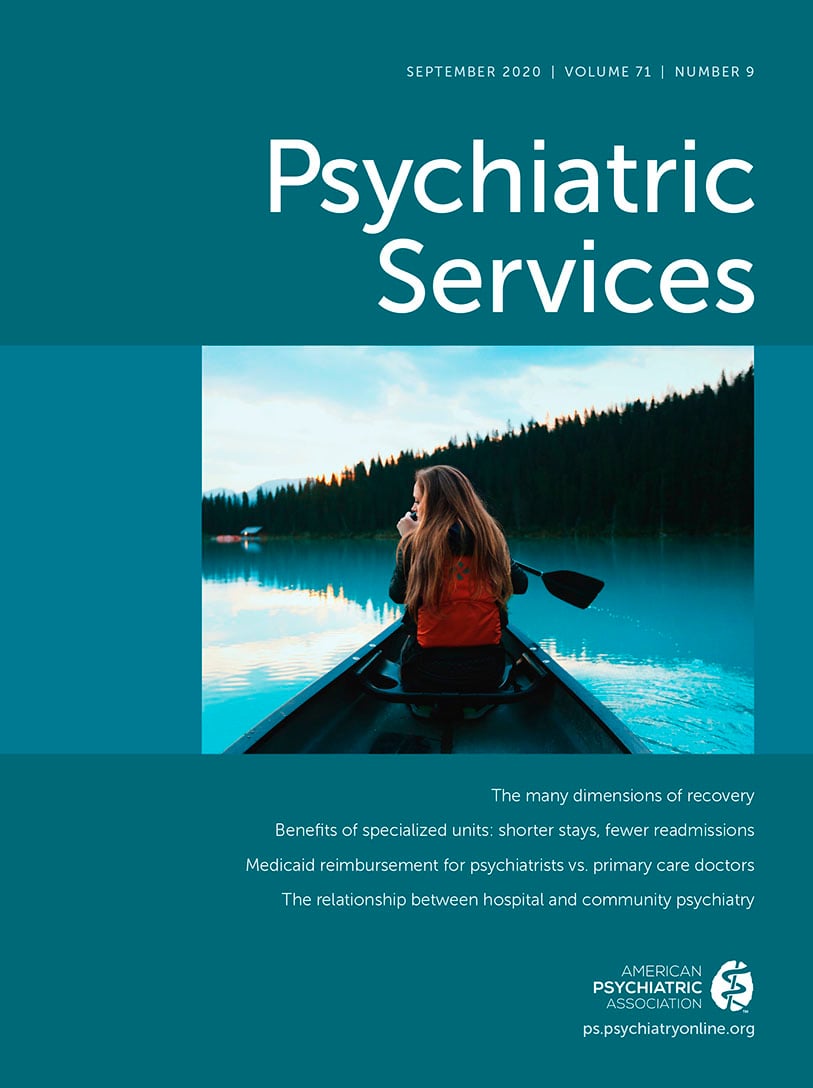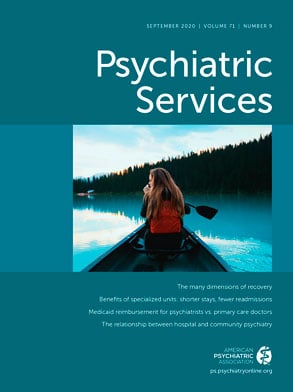Recovery, a guiding vision in the mental health field, is supported by engagement in meaningful and inclusive activity and participation experiences. In her seminal article (
1), Patricia Deegan described recovery as a process to “reestablish a new and valued sense of integrity and purpose within and beyond the limits of the disability; the aspiration is to live, work, and love, in a community in which one can make a significant contribution.” This rich, multidimensional image of recovery speaks to the value of active engagement in not only employment but also in maintaining social connections, establishing identity, and contributing to community. Twenty years on, Deegan’s description also invites reflection on the current state of theory, research, and practice related to how the mental health field addresses the activity and participation opportunities in everyday life that contribute to recovery.
The field of rehabilitation has broadly directed increased attention to activity and participation as important elements of health and well-being since their inclusion in the International Classification of Functioning, Disability and Health (ICF) (
2). The ICF distinguishes between “activity” (execution of tasks or actions by individuals) and “participation” (involvement in life situations) but merges them into a single list of “activities and participation” that covers a range of life areas and situations. We have chosen to maintain this concept of merged definitions.
To guide population-level data collection, research questions and measurement, policy, intervention development, and education, the ICF has identified a comprehensive range of domains of activity and participation that comprises a life lived well, fully, and with meaning. In the field of evidence-based psychiatric rehabilitation, practitioners have largely focused on the domain of employment, particularly in the form of supported employment. When introduced, supported employment was revolutionary, shifting practice from adopting expert-driven approaches in segregated settings to creating opportunities in mainstream employment. Decades of research underscore the value of supported employment for individuals with mental illness (
3).
The field’s emphasis on employment is not surprising. Work, more than any other form of activity, is equated with adult self-sufficiency, social identity, status, and inclusion. This focus on employment disrupted the field’s historic complacency in assertively addressing the exclusion of people with serious mental illness from valued and integrated social roles. However, an overly exclusive focus on employment yields certain limitations. For example, individuals will have varying levels of success in securing or sustaining employment. Others may have interests that do not translate to employment. Furthermore, even when employment is secured, work-life balance is important. Such examples point to the need for additional approaches to creating activity and participation opportunities beyond employment and to clearly defining related outcomes.
In essence, this goal requires returning to the core of what the innovators of supported employment challenged us in the mental health field to do: to construct, in a timely way, opportunities for activity and participation that have personal and social meaning. Toward this aim, we propose a deeper awareness and development of practices focused on the creation of a range of health-promoting opportunities for activity and participation. Advancing this vision of practice requires revisiting theories and evidence that are grounded in an activity- and participation-oriented approach. It also requires a framework practical enough to inform service delivery yet broad enough to make a case for system-level changes. We developed three critical elements to advancing this vision.
Evidence-Based Links to Health, Well-Being, and Recovery
First, we in the mental health field must recognize the evidence-based links that activity and participation experiences have to health, well-being, and recovery. There is growing understanding of the importance of activity and participation as determinants of health for both the general population and for those with significant health issues. In mental health, first-person narratives from people living with serious mental illness highlight the importance of activity and participation opportunities in their recovery. Deegan (
1) poignantly illustrated how moving beyond the alienation and despair of inertia was central to her recovery. Other qualitative studies provide powerful examples of the ways apparently ordinary activities and participation experiences can have many dimensions of meaning and promote healing (
4,
5).
Do-Live-Well is a health promotion framework that articulates the conceptual links that activity and participation have to health and well-being (
6,
7). The framework constructs a public health imperative related to what people do in their day-to-day lives. It outlines eight dimensions of experience linked by evidence to health and well-being: activating one’s body, mind, and senses; connecting with others; developing and expressing personal identity; contributing to community and society; building security and prosperity; taking care of oneself; developing capabilities and potential; and experiencing pleasure and joy. The framework emphasizes choice, meaning, balance, and routine. It highlights that activity and participation are not inherently good or bad but rather can promote or detract from health and well-being. As such, Do-Live-Well provides a way of conceptualizing the complexities of activity and participation in daily life. Ultimately, sound theoretical frameworks must identify key principles to guide practice, particularly principles related to community integration and social inclusion, given the field’s long history of creating segregated program-based activity and participation opportunities.
Interventions for Supported Activity and Participation Opportunities
Second, there is a need to develop and evaluate interventions that advance supported activity and participation opportunities. Interventions focused on directly engaging individuals with serious mental illness in health-promoting activity and participation must take into account the influence of multiple interacting factors. These include illness-related factors, such as negative symptoms that diminish motivation and emotional connections to experiences; psychological factors, such as anxiety, loss of hope, or fear of failure; and socioeconomic factors, such as poverty, prolonged segregation, victimization, and stigma. Interventions must consider what specific activity and participation opportunities demand of individuals and how these demands can be managed and adapted as needed. Furthermore, the lessons of supported employment show that practitioners must be prepared to assertively build communities to ensure inclusive opportunities. Such community-oriented interventions will work to directly influence the structures, organizations, associations, groups, and other contexts for activity and participation.
Action Over Inertia (AOI) (
8) is an example of a promising manualized intervention designed for working with individuals with severe mental illness who experience significant disengagement from activity and participation. AOI guides service users to reflect on the health and well-being benefits they wish to experience through activity and participation, supporting individuals in activity and participation experiments and longer-term commitments aligned with their personal preferences and performance needs. In addition, the intervention focuses on raising the profile of health through activity and participation at the level of service organizations. Temple University’s Collaborative on Community Inclusion (
http://www.tucollaborative.org/) exemplifies another initiative to advance practice and research related to the broad range of activity and participation experiences. For example, the collaborative addresses involvement in community, social, and civic life and prioritizes activity and participation in natural environments with natural supports. The mental health field will need to consider how efforts to promote activity and participation can best be integrated into the existing service system. From this perspective, peer support could be an important strategy for creating opportunities and facilitating engagement (
9), and interventions that address the development or enhancement of a broad range of skills (e.g., task, social, cognitive, and coping skills) may also be more effective if linked directly to supported opportunity initiatives in the community.
Activity and Participation Opportunities as a Moral Imperative
Finally, there is a need for a practice context in which access to supported opportunities for meaningful activity and participation is recognized as a moral imperative. A social justice perspective has shaped the view of opportunities for activity and participation as a human right and has informed how methods to recognize this right might be conceptualized and operationalized. The capabilities framework developed by Sen (
10), an economist, and Nussbaum (
11), a philosopher, offers a social justice perspective concerned with what people are actually able to do and to be, based on the belief that individuals should, morally, be supported to be able to live the kinds of lives they value. Nussbaum proposed 10 opportunities for functioning, to which every human should be entitled. These include opportunities to plan one’s life; use one’s senses, imagination, and thought; have attachments to material objects and people and concern for other species, such as animals; play and enjoy recreational activities; and have control over one’s life, including political and material conditions, such as voting, employment, and property. Adopting a capabilities framework focuses attention on what people can do and be in their daily lives as a key to recovery (
12,
13). It also focuses attention on the conditions of people’s lives not only as indicators of well-being but also of indignity, exclusion, and deprivation when those conditions fall below acceptable thresholds. Within the mental health arena, such social justice ideals have been integrated into useful guiding frameworks. For example, the citizenship framework focuses on the interaction of meaningful relationships, resources, rights, and responsibilities that empower individuals to gain a sense of belonging, access to valued roles, and respect as full and valued members of society (
14). This framework suggests the importance of access to the full range of activity and participation opportunities according to prevailing standards.
Conclusions
It is time to attend more directly to overlooked dimensions of health, well-being, and recovery that are grounded in opportunities for engagement in health-promoting activity and participation and to hold the system accountable for addressing challenges to accessing these important opportunities. Fundamental principles in this endeavor include recognition of the multidimensional nature of health through activity and participation, development and evaluation of interventions targeted directly to activity and participation outcomes, and advocacy for activity and participation opportunities grounded in social justice. Ultimately, this work requires partnerships with individuals and families to spur both service delivery and systems-level advances.

